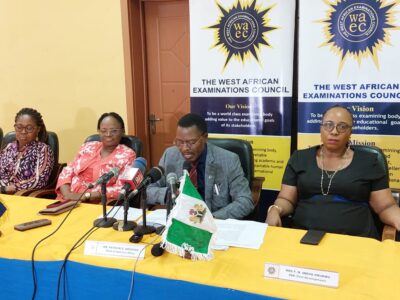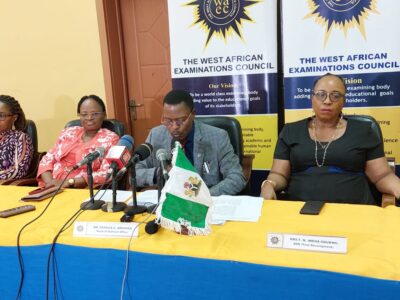GOING FOR ACADEMIC GOLD: ‘1.6 MILLION NIGERIAN STUDENTS SET FOR WASSCE MAY/JUNE 2023’ – HEAD, WAEC NIGERIA, PATRICK AREGHAN • results expected at least 45 days after final paper
By Oki Samson, Trek Africa Newspaper


A total of 1,621,853 Nigerian students from 20,851 secondary schools are set to participate in the WASSCE May/June 2023 examinations. Trek Africa Newspaper can report that the examinations diet for school candidates will take place between Monday 8th May and Friday 23rd June, 2023. The exams for SS3 students will span 7 weeks. It will mark the second year that the examinations have reverted to the regular May/June period since the COVID pandemic.

Speaking at a press briefing today, the Head of the Nigeria National Office of the West African Examinations Council (WAEC), Mr. Patrick Areghan FCDP stated: ‘I am delighted to inform you that the conduct of the West African Senior School Certificate Examination (WASSCE) for School Candidates, 2023 will take place between Monday, the 8th of May and Friday, the 23rd of June, 2023 in Nigeria, spanning a period of seven (07) weeks. For the second time in succession, we have successfully reverted to May/June period for the conduct of the examination. This is remarkable. The significance of this landmark is that the West African Examinations Council (WAEC) and the various member States, with the exception of Ghana, have now again found a common ground in respect of their academic calendars. This shows a massive recovery from the devastating effects of the COVID-19 Pandemic.’

‘The examination in focus is the School Candidates diet of the West African Senior School Certificate Examination (WASSCE), meant for the regular exit-class (SS3) students in all approved government and private secondary schools in the country. A total of One Million, Six Hundred and Twenty-one Thousand, Eight Hundred and Fifty-three (1,621,853) candidates from Twenty Thousand, Eight Hundred and Fifty-one, (20,851) secondary schools have registered for the examination. Out of this number, Seven Hundred and Ninety-eight Thousand, Eight Hundred and Ten (798,810) are males, amounting to 49.25%, while Eight Hundred and Twenty-three Thousand, and Forty-three (823,043) are females, which is 50.75% of the total candidature. The statistics shows that there is a further increase and decrease in the number of females and males respectively, compared to the 2022 diet. On the whole, the candidature for the 2023 WASSCE (SC) increased by 13, 868 over the figure of 2022 (1,607,985).

Candidates would be examined in 76 subjects, made up of 197 papers. About 30,000 practicing senior secondary school teachers, nominated by the various State Ministries of Education, would be participating in the examination as supervisors. Teachers in all the schools presenting candidates for the examination would serve as invigilators in their respective schools. Supervisors and invigilators for derecognized schools would be solely appointed, from outside the schools, by the State Ministries of Education concerned.’

On preparations for the examinations, Areghan added: ‘The Council has established a self-service system for candidates, through the CHATBOT Platform, to enable them access their entries, which in most cases, the schools do not allow them to see, contrary to instructions. The Candidate Self-Service is a service on the Request Management System/Chatbot (https://request.waec.ng) which allows students to confirm data uploaded for them by schools in order to make necessary corrections (if any) on such data. It provides two key services on the Request Management System which include Confirmation of Entry/Registration and Confirmation of Continuous Assessment Score (CASS).

The justification for the Candidate Self-Service is as follows:
incessant mistakes made by schools during CASS capturing and candidates registration. These errors were mostly not communicated to the candidates until the release of result;
large number of queries after the release of results which eventually delays the printing of affected candidates’ certificates. Also, this accounts for high rate of amendments after certificates are printed;
the generation of clean candidates’ data during the conduct of WASSCE for School Candidates and processing of results, which includes CASS and Registration/Entries information;
making error identification and correction easy for candidates and all stakeholders;
Candidates will derive a lot of benefits by making use of this platform:
candidates can access their CASS and Entry information seamlessly;
candidates can validate entry data using the CASS Reference number or Examination Number;
easy identification of errors before, during and after he conduct of examinations;
timely placement of request for correction of errors; ability to track correction on Candidates’ data (Entry registration and CASS) from the Request Management System/ChatBot; elimination of amendment on certificate and also avoid additional cost for such amendment.’

On how the students registered for the exams and some of the challenges encountered during the stage, the National Head said: ‘Though not compulsory, National Identification Number (NIN) was made a component of the registration requirements. The policy came into being in line with the directive of the Federal Government. Candidates were expected to supply their NIN at the registration stage, but it was not a compulsory requirement in order to avoid denying many eligible candidates access to the portal/examination. Even after the registration exercise, candidates were still allowed to submit their NIN for upload. Therefore, no candidate was disqualified from registration as a result of non-submission of NIN at the beginning of the exercise, or, even later.

The Continuous Assessment (CASS) score is a major component in the computation of grades for candidates in the WASSCE (SC) examination. The use of technology has made it possible for the Council to provide platforms to enable schools upload, manage and access students CASS data seamlessly and make such data available to schools on request.
Currently, the Council allows upload of CASS data in SS1, SS2 and SS3, designated as CASS Year 1, CASS Year II and CASS Year III at different upload periods. For each period of upload, the Council opens its portal free of charge for all schools and also extends the period of upload from time to time to enable all schools upload. Schools that fail to upload within the expected time frame after several free upload periods, face possible penalties. No school will have any result without complete CASS upload.
However, the Council is facing a challenge in the implementation of the CASS policy due to the un-cooperative attitude of some schools.

Failure of some schools to upload their students’ CASS data within the upload time frame;
Most schools choose to contract the CASS capture to external personnel, leading to the consumption of incorrect data during the registration process;
Use of irregular or dormant or placeholder candidates data by some schools which leads to the introduction of external students into the School candidates registration process;
Intentional delay of upload by schools in order to introduce external candidates during the WASSCE (SC) registration; The upload of fictitious scores of students to the CASS portal by some schools (this is taken care of by WAEC using the Scaling method during grading).’

‘There was a very serious challenge of non-adherence to the registration deadline, to the extent that what we started on the 10th of October, 2022 with a set deadline of January 27, 2023, and eventually extended to March 31, 2023, could not even end due to the shenanigans of some private schools who were in the habit of shopping for external candidates to make up numbers, contrary to the policy which does not allow the enrolment of Private Candidates for School Candidates examination. Entries eventually closed on April 15, 2023. The examination starts on Monday, May 8, 2023. It will surprise you to know that some schools are still bombarding us with requests for entries, even after the pre-examination, examination and post – examination materials have been produced and are being distributed to the various States of the federation. We cannot feign ignorance of the level of insecurity in the country. Conducting examinations under such a dreadful situation has been a daunting task. There are many flash points all over the country, and conducting examinations in such areas would require extra security arrangement. Consequently, we are liaising with the Inspector General of Police, Brigade Commanders, other security agencies and the various State governments to provide security in order to ensure that the examination is conducted under a secure and safe environment. We have also sought the intervention of the Honourable Minister of Education in this respect.

Similarly, our Zonal and Branch Offices have reached out to various security outfits in their respective locations for assistance. Courtesy visits and other forms of appeals have been made and we have been assured of full cooperation of the security agencies to this effect. If and when the need arises, schools in insecurity-prone areas would be relocated to safe havens, with the full approval, co-operation and participation by the Federal or State Government concerned.’
On how the Council will conduct the May/June examinations in derecognized schools, Trek Africa Newspaper gathered: ‘Schools where more than half of the candidates who registered and sat the examination were involved in examination malpractice in two or more subjects are usually derecognized. This means that such schools are no longer qualified to be counted among ‘recognized schools’ for a period of two years. It further means that: They would no longer be allowed to take the WASSCE (SC) for two years in their schools.
Though they would be allowed to register for the examination, they would have to take their candidates to other schools chosen and arranged for by the State Ministries of Education concerned. No single teacher from the schools would be nominated or appointed to serve as supervisor or invigilator in any school. During the examination, only the school principal and science subject teachers would be allowed to enter the Examination Hall (to maintain discipline) and Science Laboratories (to set the Laboratories), respectively. All expenses for conducting the examination would be borne by the school. All erring teachers, principals and proprietors would be reported to the appropriate quarters for necessary disciplinary action. All schools currently under derecognition and those that are currently ‘clean’ are warned
to desist from any and all forms of examination malpractice to avoid a second derecognition or derecognition. Meanwhile, any school where gross acts of examination malpractice are perpetuated would have their Recognition withdrawn
(Withdrawal of Recognition).’
On how WAEC intends to deal with Examination Malpractice, Patrick Areghan revealed to Trek Africa Newspaper, ‘let me remind you that the Council decisively deals with examination malpractice of any kind. The penalties for involvement in examination malpractice will always, without compromise, be meted out to erring candidates, invigilators, supervisors, schools, WAEC officials, etc, as would be approved by the Nigeria Examinations Committee (NEC), which is the highest decision-making organ of the Council that sits on examination matters in Nigeria. The Council, on its part, has rolled out several awareness campaigns, organized seminars for school proprietors, principals, teachers, students and other key stakeholders in Branch and Zonal offices nationwide to sensitize them on the ills of this evil. Similarly, we have made flyers, banners, posters and other forms of reminders to further keep the message afresh on the minds of all stakeholders.
It is, therefore, on this note that I call on parents and guardians to encourage their wards to study diligently and desist from engaging in any form of examination malpractice. The mass media must play its watch-dog role. The various Ministries of Education should call their principals, teachers and other officials serving as inspectors and/or supervisors, to order. Supervisors should desist from allowing candidates to make use of their cell phones or availing the candidates of their own (supervisors’) cell phones. They should avoid writing answers on the chalk board or dictating same to candidates. Any form of aiding and abetting, collusion, etc, should be avoided. School principals and teachers should sensitize their students on the dangers of this menace. Every candidate and examination functionary must play by the rules, which are well stipulated in the WAEC Syllabus and Guidelines for the conduct of examinations, issued to schools. Erring schools will be derecognised; erring officials would be adequately punished, while erring candidates would lose their results.’
‘Let me again warn the operators of the so-called “Miracle Centres” that their game is up. I wish to stress that their existence is only in the imagination of their operators and patrons as WAEC has no such schools in its records, even though we know they exist. We are closely watching all suspected schools.
However remotely located any school may be, it will not escape our radar as our in-built anti-malpractice mechanism will be deployed to catch them. I want to reiterate that it is left for candidates to choose between something or nothing; having their results or the risk of not having their results and wasting the entire six years they spent in school; and for schools; having their results or facing the risk of not having their results and being derocognised. Please be warned.
We also want to sound a note of warning to all operators of rouge-websites that WAEC will not condone their heinous acts during the conduct of the fast-approaching examination. Parents are hereby advised to desist from patronising these evil-doers who are hell-bent on frustrating the efforts of WAEC and destroying the destiny of their children. They should have nothing to do with them as that would only lead to the truncation of their children’s future. Meanwhile, we are perfecting strategies, as usual, with all relevant agencies to checkmate these fraudsters and bring them and their patronizers to book. There will be no hiding place for them. Be warned!
We shall do our best to monitor and inspect the conduct of the examination at all centres. We appeal to all schools, authorities and supervisors to co-operate with us. Supervisors with itching fingers and proprietors and principals desperate for “headline results” are hereby warned to behave themselves. Only WAEC and Ministry of Education officials are accredited to monitor/inspect examination centres. We request journalists to keep their ears to the ground for fake inspectors, masquerading as WAEC and Ministry of Education officials, who will be out to extort money from schools and candidates. Anyone caught would go in for it.’
On WAEC e-Learning Portal for Learning Support, Trek Africa Newspaper can report that ‘WAEC has again made available its e-learning portal as a way of helping candidates with learning materials that will equip them with the necessary requirements and expectations needed to write and pass their examinations. Students’ performances in previous examinations are analyzed with the aim of detecting their weaknesses and proffer solutions to aid better performance. It was this learning portal that resulted in the beautiful performance in 2020, during the hey-days of COVID-19. Candidates should visit https://WAEConline.org.ng to access the portal.’
On release of results of the May/June 2023 exams, ‘in line with our usual practice, the results of candidates sitting the examination will be released 45 days after the conduct of the last paper, while the certificates will be printed and issued to schools in less than Ninety (90) days after the release of results. WAEC Nigeria, in its bid to serve the Nigerian Child better, has acquired a state-of-the-art digital certificate printer that enables us to print and issue certificates to candidates within a record time.’
The West African Examinations Council, being a foremost examining body, adding value to the educational goals of its stakeholders, has not rested on it oars, since the past seventy-one years of its existence. The Council has continued to improve on its service delivery across board, by optimally leveraging Information Communication Technology (ICT) in a fast growing and fast-paced digital world.
‘Under my watch, great strides have been made in the following areas: EDUSTAT
The Nigeria National Office of the Council launched the Educational Statistics (EDUSTAT) platform on March 22, 2023. This platform was designed to take the edge off the manual access to data by stakeholders and provide detailed analysis and insight to data. The platform seeks to change the view of data analysis by providing users with easy-to-use tools, to analyse and visualize WAEC data. Users can log on to www.waec.edustat.ng.
The platform is very useful for researchers, students, organizations and governments at all levels. It solves the problem of falsification and all that. It is now in full operation and researchers are maximising its benefits. DIGITAL CERTIFICATE.
There is absolutely no doubt that WAEC Nigeria is currently experiencing a paradigm shift in the quality of its service delivery. The digitalization of WAEC products and services is by far one of the greatest achievements of this administration. The launch of the WAEC Digital Certificate Platform which allows candidates, who sat WASSC examination between 1999 to date to access, confirm and share their certificates, whether lost, burnt or destroyed, and recover examination numbers directly from the WAEC data-base, is one of our cherished achievements. The platform is currently being accessed by users all over the world. Permit me to seize this opportunity to inform all stakeholders that WAEC will no longer provide manual confirmation or stamping of certificates of candidates. Organization and institutions are hereby encouraged to avail themselves of the platform.
Meanwhile, digital certificates of candidates who sat WAEC examinations between 1980 – 1988 would soon be available on the DigiCert platform as work on them has reached an advanced stage. e-LIBRARY FOR CANDIDATES & OTHER STAKEHOLDERS
The latest of our innovations, the e-library, powered by SIDMACH Technologies, will be unveiled after the necessary approvals by the Registrar to Council. This portal will present to candidates past questions and marking schemes, teaching them how to respond to questions, thus making them to be less dependent on speculations. It is a case of teaching them how to fish themselves without necessarily giving them fish. This site, we believe, will be wildly visited. ROBUST COMPUTER BASED TEST SERVICES.
In the interest of those who may not know, I would like to inform all our stakeholders and the general public that WAEC offers a very reliable and robust Computer Based Tests and Aptitude Test Services, both at the WAEC Testing and Training Centre, Ogba – an edifice that boasts of state-of-the art facilities, and the Aptitude Tests Department, Yaba.
The facilities have been of help to many governmental and non-governmental agencies, including the Nigeria Police, Multi-national and Oil Companies, Universities, JAMB, etc, for the conduct of their recruitment exercises, scholarship schemes, semester examinations, UME, etc. WAEC CHATBOT
Interestingly, the general public can now gain access to all WAEC services online and real-time through the WAEC Request Management Portal (WAEC CHATBOT) by logging online to www.request.waec.org, or, chat with us on WhatsApp with the following numbers:
– 08179439269
– 07061741253
It can also be used by candidates to verify their entries and CASS upload.
(6) WAEC VERIFY
This is a platform that provides on-line access to tertiary institutions and other establishments, to WAEC data base for the verification of prospective students’/applicants’ results. CENTRE LOCATOR
This allows users and visitors to track WAEC schools/centres and get geolocation information for monitoring during the conduct of WASSCE and other operations’, the National Head of WAEC NIGERIA, Patrick Areghan concluded.










